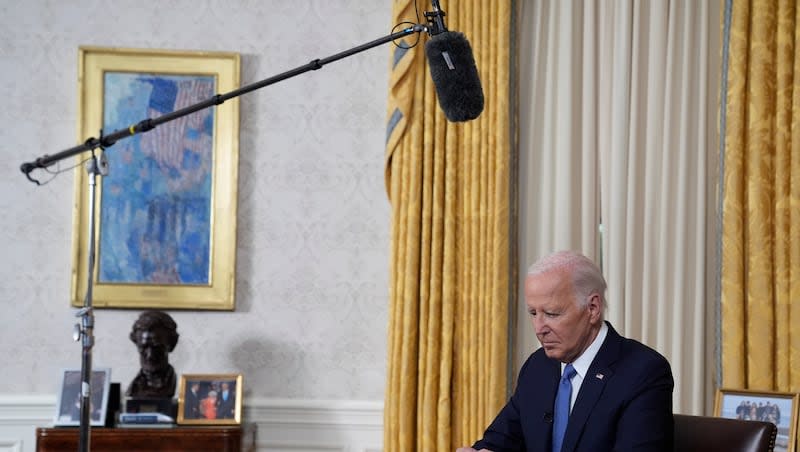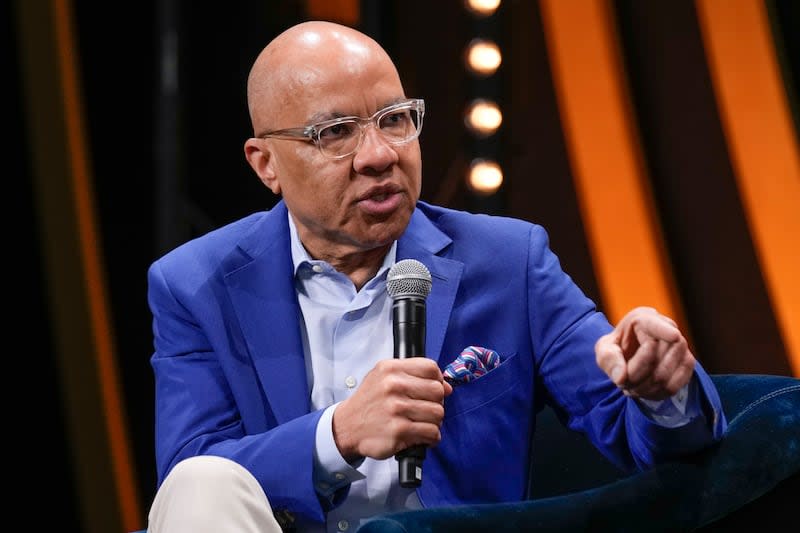Perspective: How do you know when it’s time to move on?

- Oops!Something went wrong.Please try again later.
- Oops!Something went wrong.Please try again later.
When Darren Walker announced that he was stepping down as president of the Ford Foundation this week, he told The New York Times that it was time for him to let someone else take over.
“Some people stay in foundation jobs too long because it’s intoxicating every day to be in a position where people are deferential, where people are constantly offering thanks and gratitude,” he said.
He noted, “Philanthropy as a field needs new leaders and needs a constant refreshing because as a sector we can be self-satisfied and lose the edge to our work.”

There are all sorts of reasons why people stay in jobs for too long. We can speculate about why President Joe Biden insisted on running for reelection for months after it was clear that he was not up to the job. Certainly, the power can be intoxicating, as Walker noted. And it can also become easy to think that you are the only person who can do the job. (Biden reportedly told people that he thought he could have beaten Trump in 2016 and was pushed out of the way, with disastrous results for his party.)
Longer lifespans also make it difficult for people to walk away and raise all sorts of questions. What will you do with the rest of your life? If you can make it to 80, why not 90? Should you go out at your peak? Why not go out a little after your peak? If you teach or write or work at a nonprofit a little longer than you should, will it really tarnish your legacy?
For some people who won’t leave, there is undoubtedly a sense that they will continue working until someone stops them. Sen. Bob Menendez, D-N.J., who was recently found guilty in a federal bribery and corruption trial, had been holding out on resigning his position for months, but finally announced his resignation this week. Even after a trial in which prosecutors presented evidence of gold bars, a Mercedes-Benz and almost half a million dollars being paid to him and his wife by foreign entities, Menendez thought he could hold on to his job.
The head of the Secret Service, too, was under pressure to resign for more than a week after the failures of the agency to protect former President Donald Trump were revealed.
In his questioning of Kimberly Cheatle, Rep. Ro Khanna, D-Calif., asked Cheatle if she knew what the Secret Service director did after the attempted assassination of former President Ronald Reagan. “He remained on duty,” Cheatle said. Khanna replied, “He resigned.”
The surprise was not only that Cheatle seemed to not know the answer to the question — after it had been mentioned in so many news stories — but that it was her automatic assumption that when things go south, the people in charge stay in charge. (H. Stuart Knight, the Secret Service director when Reagan was shot, did not immediately resign, but did so after eight months.)
Cheatle, who finally resigned July 23, kept insisting that “the buck stopped” with her. But what does that mean if not that you have to go?
The contrast with how people used to act is worth noting. Obviously, shame used to play a bigger role. And so did honor. When wrongdoing or incompetence was revealed, people beat a hasty retreat out of the spotlight. This was a point made frequently after former President Bill Clinton’s affair with Monica Lewinsky was revealed. In a previous era, presumably, he would have resigned.
But even people who haven’t done anything terrible are having a hard time figuring out when to leave. The view we have into other people’s lives through technology makes things more difficult. Through social media, we can see (or think we can see) what is happening inside institutions after we leave them. We can also see what our successors are doing — and maybe we think we could have done better. The problem with FOMO, the fear of missing out, is not just feeling that we should be somewhere else. It’s also that we should have stayed. That if we had, things could have turned out differently. It must be difficult to watch something that you had a role in building be ruined by the person or people who came after you.
But perhaps the best way to avoid that scenario is stepping aside before things get bad and then working to ensure that your successor is qualified and well trained. Maybe they won’t do things exactly as you have envisioned, but it could come closer, and you can move on confidently, as Walker has done. As he told The Associated Press, “I am taking my shoes with me and the next leader will bring their shoes, because those will be the right shoes for the next 12 years.”
Naomi Schaefer Riley is a senior fellow at the American Enterprise Institute, a Deseret News contributor and the author of “No Way to Treat a Child: How the Foster Care System, Family Courts, and Racial Activists Are Wrecking Young Lives,” among other books.

